By Chelsea Yates
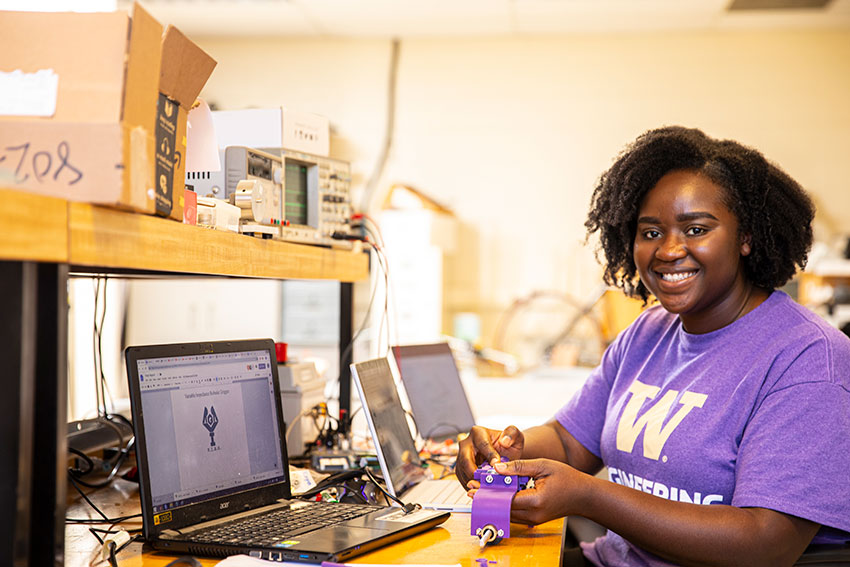
Ewurama Karikari, BSME '19. Photo by Dennis Wise / University of Washington
Speak up, ask for help, be clear about what you need, stay focused, do the work, seize opportunities and have a positive impact on others. These actions have shaped Ewurama Karikari’s Husky experience. Through involvement in UW programs and organizations — STARS, the National Society of Black Engineers, the UW African Student Association and the McNair Scholars — and several internships and research assistantships, she has aimed high for herself while also making time to help others.
We recently spoke with Karikari, who graduated in June with a ME bachelor’s degree and concentration in mechatronics, about her many UW passions — STARS, math, community-building, Ghanaian dance and robotic systems — as well as what she hopes to pursue in graduate school this fall at Stanford University.
How did you become interested in UW ME and mechatronics?
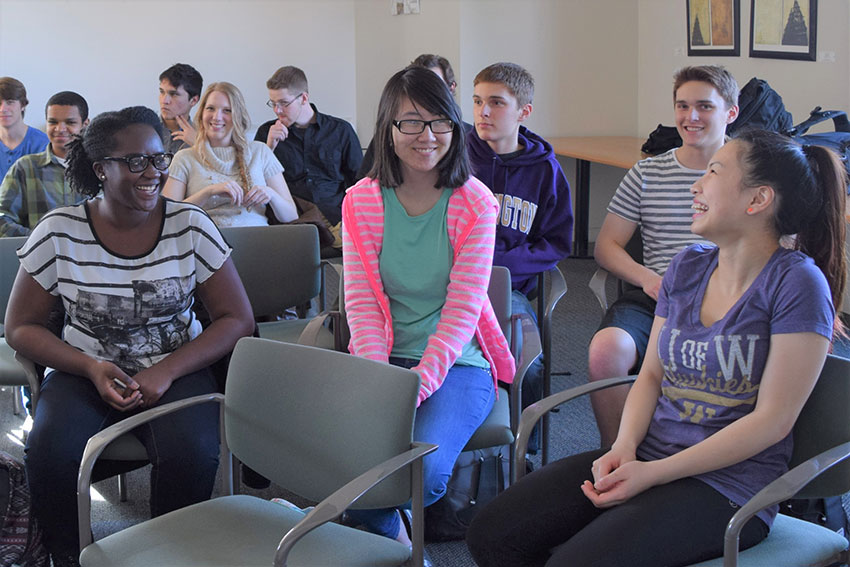
Karikari, left, at a STARS workshop. “STARS helps make the UW — which can seem huge and overwhelming — much smaller and accessible,” she says. Photo courtesy of STARS
I attended high school in Spanaway, Washington. I loved math and my school’s robotics club. During my senior year, I was invited to apply to UW’s STARS program, which provides Washington students from economically and educationally disadvantaged background extra academic support, mentoring and funding to pursue engineering degrees. Fortunately I was accepted — something I’m still so thankful for.
STARS introduces different engineering fields to students and ME seemed like the right fit, especially as I learned more about how math plays a role in device development. A few students in my STARS cohort were also interested in ME, so we took classes together and shared experiences like pursuing mechatronics as a focus area.
Mechatronics integrates mechanical, electrical and computer engineering, and it’s helped me focus my dream of working in robotics. Professor Shen’s class — System Dynamics, Analysis and Design — was a real eye-opener and set me on the mechatronics path. And Professor Garbini’s Embedded Systems class blew my mind; I discovered that I loved working with motors and C programming. ME’s mechatronics has set me up for graduate school where I hope to concentrate more on using controls in robotics systems.
Tell us more about STARS.
STARS students participate in a “redshirt” year their first year at UW during which they develop their study skills and foundational skills in math and science. STARS also provides an amazing community of students, mentors and tutors. It helps make the UW — which can seem huge and overwhelming — much smaller and accessible. During their first year, STARS students share the same schedule and take the same classes. They live in the same residence hall, so it’s like having an instant, built-in network. And community is so important when you’re in college; no one wants to feel like they’re alone, and STARS makes sure they don’t. STARS also helped me “see” more people who look like me in engineering — women, people of color, first generation students. That alone was huge.
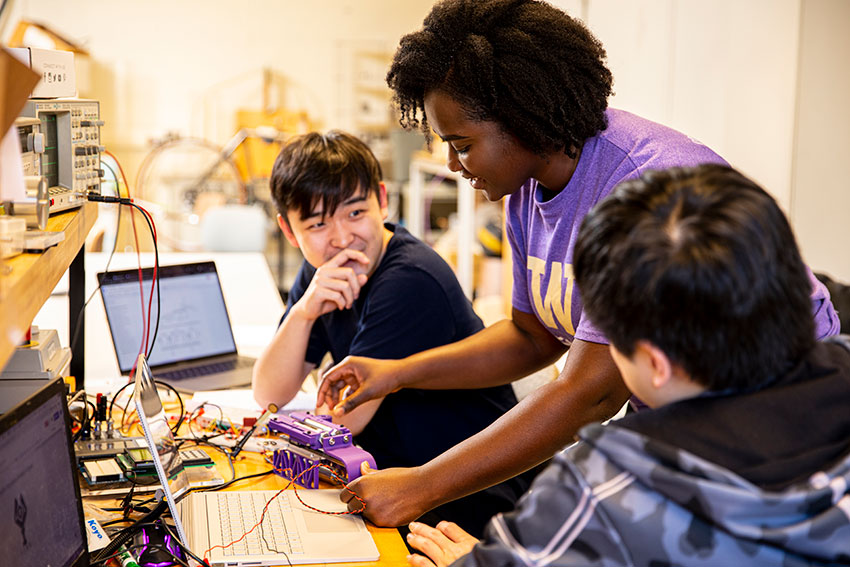
“Mechatronics integrates mechanical, electrical and computer engineering, and it’s helped me focus my dream of working in robotics,” says Karikari, here with her ME capstone teammates Mianzhi (Tony) Zhou and Benjamin Yat Chun Wong. Photo by Dennis Wise / University of Washington
You served as a calculus tutor for STARS students. What was that like?
STARS helped me develop self-confidence, and I wanted to pass that on. As a calculus tutor I tended to work with about 15 first-year STARS students per workshop. STARS workshops are super helpful, but they require time and energy outside of classes. They teach you not just how to crank out answers but how to problem-solve and study. I wanted students to have the confidence that they could get through the math requirements, that they could be engineers.
You’ve had some interesting internships and research lab experience. Tell us about them.
Yes, they’ve been amazing! For two summers I held internships with Boeing, first on the 737 Product and Technical Integration team and then with the 737 Flight Controls team. As I moved through my ME classes, I was drawn to research. I worked as an assistant in Professor Mescher’s Polymer Optics Lab, which focuses on fiber optics manufacturing, and last summer as part of the TANMS nanosystems research program at the University of California, Los Angeles. This program, which is focused on developing tiny devices for the bloodstream, exposed me to graduate-level research.
What excites you the most about graduate school?
Getting to do more mechanical engineering research in integrated systems and robotics! I feel fortunate to have been part of the McNair Scholars’ Program at the UW, which STARS instructor Dave Prince first told me about and encouraged me to apply to. My family moved to the U.S. from Ghana when I was young, and my sister and I are the first in our family to attend college. So higher education is new territory for us. The McNair program preps first-generation, low-income and minority students who want to go to grad school and are interested in academic careers. I presented my research at a McNair conference in Chicago, which was so cool. I can’t wait to do more research.
Speaking of Ghana, you’ve been involved in the UW’s African Student Association (ASA), right?
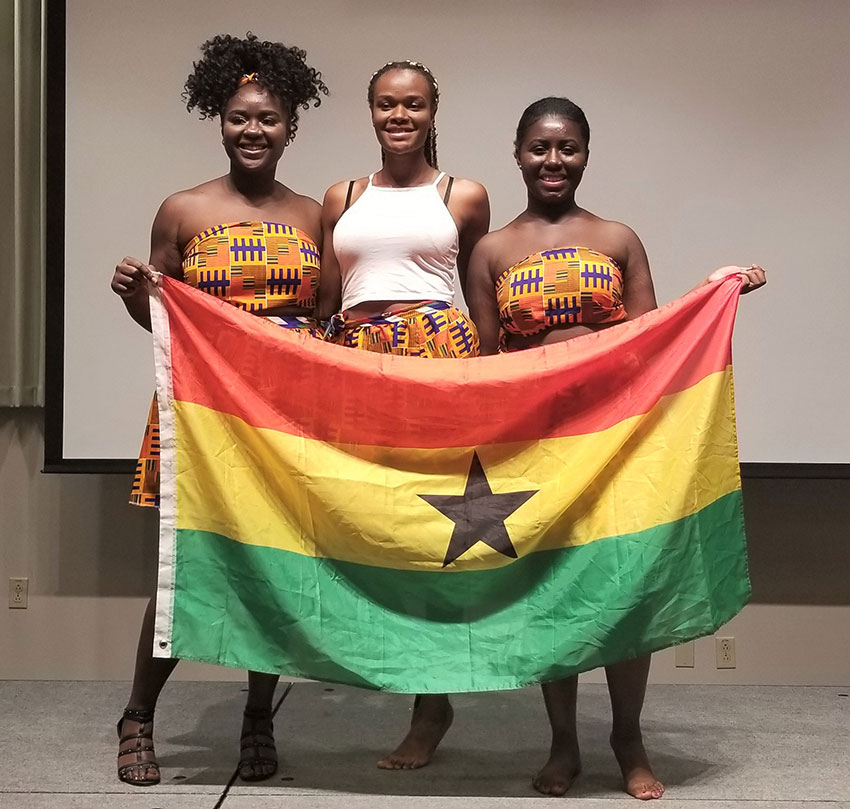
Karikari, left, performs as part of the UW African Student Association’s Ghana dance group at the 2018 Afro Caribbean Night.
Yes, for the last four years, I’ve been a part of the ASA’s Ghana dance group, and have performed each year at Afro Caribbean Night on campus. There aren’t many UW students from Ghana, but our dances are really fun. We often have non-Ghanaian students want to join our group to take part in the dancing.
Being involved in a non-STEM community provided me with an outlet and a way to get to know other African Americans at UW. Like STARS, the ASA helped me find a community where I was free to express myself. It also gave me a space to learn about and establish my identity as a Ghanaian American women pursuing mechanical engineering!
As your time at UW ends, what advice would you like to pass on to future engineering students?
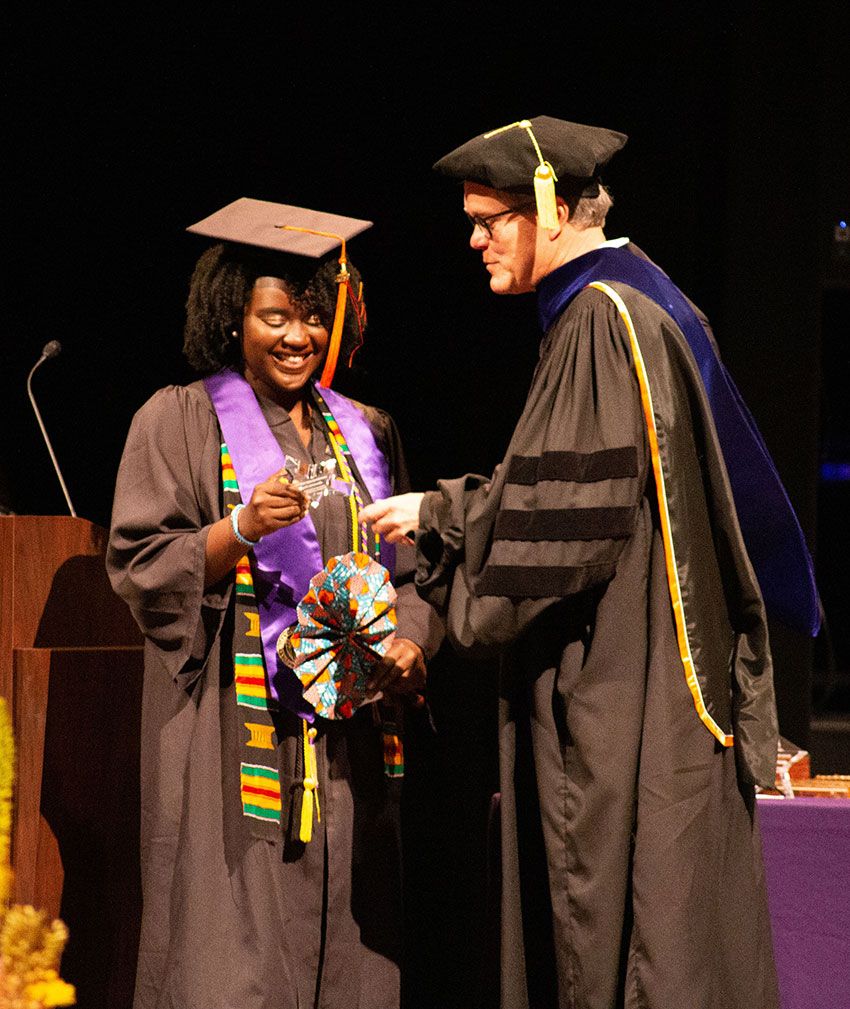
Karikari receives an award from ME professor and chair Per Reinhall at the 2019 ME graduation ceremony. Photo by Aman Kalia
Speak up for yourself, and ask for whatever you need — resources, information, support, guidance. People at the UW want to help but they don’t know what you need, so be open and direct. Make a point to interact with other students; they’re often going through the same things that you are, so build community and share those experiences. And talk to your TAs and professors; they have office hours for a reason! If you like research or are thinking about graduate school, look into research assistantships, which you can learn about on the NSF website. They can be a great way to develop hands-on experience, explore other cities and get a taste of other schools and programs.
Find out more about the UW's STARS program and ME’s degree options for undergraduates.
Originally published July 3, 2019